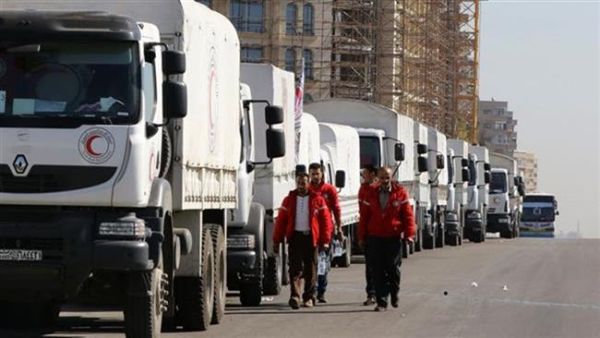A UN humanitarian aid convoy was attacked near Aleppo on Monday as a week-long ceasefire in Syria brokered by Russia and the United States collapsed.
The United Nations said 18 of 31 trucks taking part in an aid mission near Urum al-Kubra, north-west of Aleppo city in northern Syria, were hit.
At least 36 people were killed, including 12 in the aid convoy, according to activists and the Syrian Observatory for Human Rights, a Britain-based monitoring group.
While the UN said the source and type of attack is under investigation, a senior Obama administration official, who spoke to reporters on a conference call, said that "from all indications, it was an airstrike, and it wasn't one from the coalition."
The official said that it wasn't clear at this point if Russian or Syrian jets were involved. "In either case, the Russians have the responsibility certainly to ... refrain from taking such action themselves, but they also have the responsibility to keep the regime [of Syrian President Bashar al-Assad] from doing it."
Another US administration official said that the attack "has dealt a serious blow to our efforts to bring peace to Syria and that it is up to the Russians to demonstrate seriousness of purpose – not just through words, but through actions that demonstrate that this process remains viable."
UN humanitarian chief Stephen O'Brien said he was "disgusted and horrified" by the "sickening" attack, adding that a warehouse of the Syrian Arab Red Crescent (SARC) was also hit and an SARC health clinic severely damaged.
"There can be no explanation or excuse, no reason or rationale for waging war on brave and selfless humanitarian workers trying to reach their fellow citizens in desperate need of assistance," O'Brien said in a statement.
The convoy planned to reach aid to 78,000 people.
Rebel-held eastern Aleppo city, with hundreds of thousands of residents, has been cut off from aid deliveries since July, despite the recent truce.
The airstrikes in the city and its vicinity began shortly after nightfall, following a declaration by the Syrian army that the ceasefire had ended.
Rebels and the government traded blame for the collapse of the deal, each claiming the other had breached the agreement hundreds of times since it went into effect a week back.
US Secretary of State John Kerry said he was awaiting information from Russia on the steps going forward. He was speaking in New York, where world leaders are gathering for the annual UN General Assembly.
"The important thing is the Russians need to control Assad, who evidently is indiscriminately bombing, including humanitarian convoys," Kerry said.
"Let me be clear: if this callous attack is found to be a deliberate
targeting of humanitarians, it would amount to a war crime," O'Brien said, and called for an independent investigation into the attack.
"We are deeply shocked that humanitarian workers and missions have yet again suffered from the brutality of this conflict," said Ingy Sedky, a spokeswoman for the International Committee of the Red Cross.
Ibrahim al Hajj, a member of the White Helmets, a rescue group operating in rebel-held areas, told dpa there had been a large number of airstrikes.
"Our hospitals are lacking essential first aid supplies. Simple things like bandages are lacking," he said by telephone from eastern Aleppo. "The situation inside the hospital is miserable."
The parties to the conflict had forecast the collapse of this most recent ceasefire as tensions mounted.
An airstrike on a Syrian army post in the east of the country on Saturday by the US-led anti-Daesh coalition killed more than 60 Syrian soldiers.
The US and its allies expressed regret for the incident, with Washington saying Islamic State was the target.
The army statement said the ceasefire "was a real chance to stop the bloodshed, but the armed terrorist groups flouted this agreement and failed to comply with the application of any provision of its clauses," alleging 300 violations by rebels.
Mohammed Alloush, a former top negotiator and a member of the Islam Army (Jaish al-Islam) rebel group, blamed the government, claiming "this regime has violated the ceasefire more than 250 times."
Ahead of the Syrian army announcement, Russian General Sergei Rudskoi accused the rebels of violating the deal, rendering it "meaningless."
Some aid was delivered to both rebel-held areas and government-controlled territories shortly before the army declared the ceasefire over.








